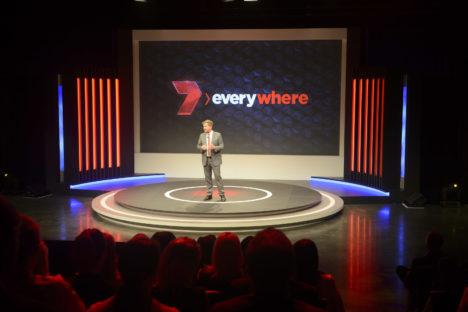Seven warns the days of big rights deals for sport are over after booking $745m loss
Seven West Media CEO Tim Worner has fired a shot across the bows of Australia’s sports administrators, warning that the days of billion-dollar TV rights deals are over after the media company reported a $745m net loss for the financial year.
And the media company has also revealed it is working on a secret over-the-top platform, dubbed Project 8, as it continues to drive its total video approach to the market.
In a results briefing to media and analysts Worner returned to the issue of sports rights several times, saying that market changes meant sports rights would no longer command a premium and that administrators would have to consider the value that appearing on free-to-air TV delivered back to the sport.
“These sports codes have to start to recognise the power of what we bring to them,” Worner said.
Highlighting cricket’s Big Bash League on rival Ten, Worner said the explosive growth in the popularity of the sport did not take place until the Big Bash moved from pay TV to free-to-air.
“Now I think it’s fair to say that sports rights have reached a tipping point in this country,” Worner said.
“Sports rights are undeniably valuable, but free to air broadcast also brings incredible value to these sporting codes. Given changes in the market, price rises are not sustainable. The tennis for example is a great launch platform, the US Masters, the NFL and the Superbowl- these are great events. But we have to reach a position where the economics stand up for all parties, where the power and reach that free-to-air television brings to these sports is recognised.”
Seven is understood to have written down $70m on its broadcast rights for the Tokyo Olympics and Worner said the network had made a series of “market assumptions” when signing sports contracts which “did not eventuate”.
However, Worner was quick to highlight the importance of the AFL to the network’s fortunes.
“Our new rights agreement with the AFL has been immediately positive,” Worner said.
“The number of people watching this most extraordinary season of the greatest game of all was up 8% this financial year. On top of that we have something truly exciting in the making with success of AFLW.”
He noted that Seven had managed to absorb the rise in AFL rights costs through internal cuts.
“We largely offset the increased fee for our AFL rights through our cost-management program,” he said.
He also took the opportunity to again attack the tax paid by overseas-based rivals.
“Underlying profit after tax of $166.8m excludes significant items. Just on that tax, we paid $56m, a fair bit more than the competitors who are changing the market in which we compete.
“This has been a challenging year, there is no doubt about it,” Worner said.
“Market conditions have not been easy, but our transformation continues at pace.”
Worner was at pains to promote the success of Seven’s push into content creation through Seven Studios, saying it had more than 850 hours of content being sold around the world with sales up 11%.
He also announced the secret Project 8 initiative.
“Our stable of total video assets across OTT, social, broadcast and production provide a clear advantage and ability to strongly compete,” Worner said.
“The next step will be the launch of Project 8, our internal working name for our owned and operated OTT product to be launched later this year. Project 8 will also forge direct data-driven relationships with our consumers. We will share more details on this exciting opportunity closer to launch.”
While not acknowledged in the results, Worner did address questions about the impact of the Amber Harrison scandal on the network and its reputation, largely sidestepping the question but saying he did not believe it had had an impact.
“It we are talking about financial performance, I don’t thinks so,” Worner said.
“If we are talking about brand health, I guess there are various ways that we would measure the health of our brand. Two of the big ones for us are ratings and revenue and and in that last half of FY17 we didn’t lose a ratings week and we returned an excellent revenue share.”






Their own streaming platform is a very good idea and will be received well.Just like Disney’s decision to pull their content from Netflix in a couple of years, which was also received very well. People love signing up for multiple streaming services!
Deadset, this current generation of publisher CEOs are absolute [edited under Mumbrella’s comment moderation policy]
User ID not verified.
Any update on legal fees for the year? It wouldn’t have been a cheap year methinks.
User ID not verified.
Tim is clueless, he thinks TV is the only player here.
Pretty sure a billion quid from Facebook or Google to change the viewing habits of most Australians is worth the investment. They could easily take AFL off traditional broadcasters with out the need to make it pay, they would make 7 pay though.
You only have to look at Optus and the EPL for a great example of digital disrupting traditional sports broadcasters.
User ID not verified.